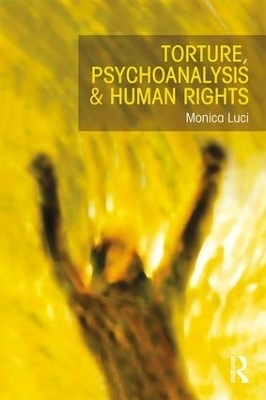
Torture, Psychoanalysis and Human Rights
Routledge (Verlag)
978-1-138-90860-4 (ISBN)
Monica Luci argues that torture performs a covert emotional function in society. In order to identify what this function might be, a profile of ‘torturous societies’ and the main psychological dynamics of social actors involved – torturers, victims, and bystanders – are drawn from literature. Accordingly, a wide-ranging description of the phenomenology of torture is provided, detecting an inclusive and recurring pattern of key elements. Relying on psychoanalytic concepts derived from different theoretical traditions, including British object relations theories, American relational psychoanalysis and analytical psychology, the study provides an advanced line of conceptual research, shaping a model, whose aim is tograsp the deep meaning of key intrapsychic, interpersonal and group dynamics involved in torture.
Once a sufficiently coherent understanding has been reached, Luci proposes using it as a groundwork tool in the human rights field to re-think the best strategies of prevention and recovery from post-torture psychological and social suffering. The book initiates a dialogue between psychoanalysis and human rights, showing that the proposed psychoanalytic understanding is a viable conceptualisation for expanding thinking of crucial issues regarding torture, which might be relevant to human rights and legal doctrine, such as the responsibility of perpetrators, the reparation of victims and the question of ‘truth’.
Torture, Psychoanalysis and Human Rights is the first book to build a psychoanalytic theory of torture from which psychological, social and legal reflections, as well as practical aspects of treatment, can be mutually derived and understood. It will appeal to psychoanalysts, psychoanalytic psychotherapists and Jungians, as well as scholars of politics, social work and justice, and human rights and postgraduate students studying across these fields.
Monica Luci, PhD, is an analytical psychologist and relational psychoanalyst, with extensive experience in the psycho-social assistance and psychotherapeutic work with asylum seekers and refugee survivors of torture. On the topics of survivors of torture and post-traumatic states in psychological assessment, psychotherapy and research, she has contributed to a number of international conferences and taught in several professional and academic contexts. She is also an author, translator and editor of publications on the themes of trauma, collective violence, cultural studies, transcultural psychology, sexuality and ethical issues.
Introduction
PART ONE: THE PHENOMENON OF TORTURE
Chapter 1: Torture: what is it? A definition of the field of inquiry
Chapter 2: Torturous societies
Chapter 3: Social actors of torture
PART TWO: A PSYCHOANALYTIC UNDERSTANDING OF TORTURE
Chapter 4: Paradoxical Multiple Self States and Monolithic Self States: destinies of the Reflective Triangle
Chapter 5: The emotional life of torturous societies: Monolithic Societal States
Chapter 6: The Splintered Reflective Triangle in bystanders, perpetrators and victims of torture
PART THREE: IMPLICATIONS FOR HUMAN RIGHTS
Chapter 7: The permissibility of torture
Chapter 8: Three fields of application in human rights: responsibility of perpetrators, reparation of victims and the problem of truth
| Erscheinungsdatum | 28.05.2017 |
|---|---|
| Zusatzinfo | 6 Line drawings, black and white; 1 Illustrations, black and white |
| Verlagsort | London |
| Sprache | englisch |
| Maße | 156 x 234 mm |
| Gewicht | 362 g |
| Themenwelt | Geisteswissenschaften ► Psychologie ► Klinische Psychologie |
| Geisteswissenschaften ► Psychologie ► Psychoanalyse / Tiefenpsychologie | |
| Medizin / Pharmazie ► Medizinische Fachgebiete ► Notfallmedizin | |
| Medizin / Pharmazie ► Medizinische Fachgebiete ► Psychiatrie / Psychotherapie | |
| Sozialwissenschaften ► Politik / Verwaltung ► Politische Theorie | |
| Sozialwissenschaften ► Soziologie | |
| ISBN-10 | 1-138-90860-6 / 1138908606 |
| ISBN-13 | 978-1-138-90860-4 / 9781138908604 |
| Zustand | Neuware |
| Haben Sie eine Frage zum Produkt? |
aus dem Bereich


